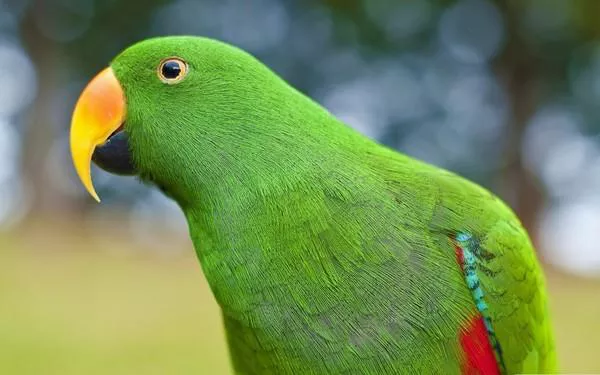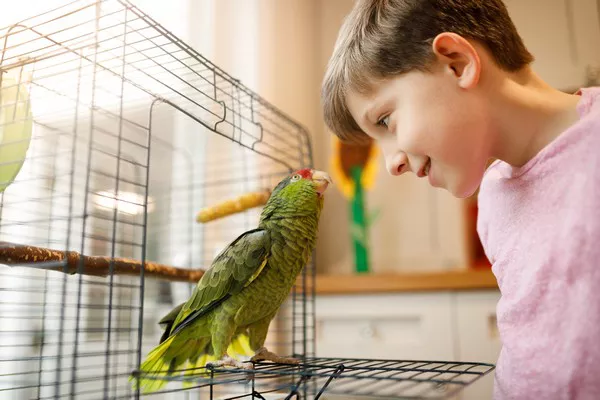Sun conures are small, colorful parrots known for their vibrant plumage, playful personalities, and sociable nature. As a pet, sun conures make excellent companions for many bird lovers, but prospective pet owners often wonder: Can sun conures be left alone?
This question is crucial for anyone considering adopting a sun conure, as it helps ensure that both the bird and its human family members have a good quality of life. In this article, we will explore the behavioral traits, care requirements, and important considerations for sun conures, especially when it comes to their need for companionship and social interaction.
Overview of Sun Conures
Before delving into whether sun conures can be left alone, let’s start with some basic information about this unique species.
Scientific Name: Aratinga solstitialis
Size: Adult sun conures are medium-sized parrots, typically measuring 12 to 14 inches (30 to 36 cm) in length from beak to tail.
Appearance: Known for their brilliant, rainbow-like feathers, sun conures have a predominantly golden-yellow body with green and blue accents on the wings and tail. Their bright coloration is one of their most striking features, making them very popular as pets.
Lifespan: Sun conures have an average lifespan of 20 to 30 years, with proper care, which is quite long compared to many other pet species.
Origin: Native to northeastern South America, particularly parts of Brazil, Venezuela, and Guyana, sun conures typically inhabit tropical forests and savannas.
Sun conures are renowned for their intelligence and playful nature, but they also require a lot of care and attention to thrive. They are not considered low-maintenance pets, so their living conditions must be carefully considered before making the commitment to adopt one.
The Social Nature of Sun Conures
One of the defining traits of sun conures is their highly social nature. These birds are not solitary by nature; in fact, they are often seen in flocks in the wild. As a result, sun conures naturally crave companionship and interaction with others.
When a sun conure is in its natural environment, it thrives in the company of other birds, where they can engage in social behaviors such as vocalizations, preening, and even sharing food. In captivity, sun conures typically form strong bonds with their human caregivers. This can create a situation where they become quite reliant on their owners for companionship, which is an important factor to consider when deciding whether a sun conure can be left alone.
Can Sun Conures Be Left Alone?
The short answer is: No, sun conures should not be left alone for long periods of time.
While they can be left alone for short stretches (such as when you’re at work or running errands), sun conures need a significant amount of daily interaction and stimulation. Here are the main reasons why sun conures should not be left alone for extended periods:
1. Social Needs
As mentioned earlier, sun conures are highly social birds. They form strong attachments to their human caregivers and other pets in the household. When left alone for too long, they can experience feelings of loneliness and boredom, which may lead to behavioral problems.
Without proper social interaction, sun conures can become depressed, anxious, or even aggressive. For instance, some birds may develop excessive screaming or feather-plucking as a result of stress caused by loneliness. These behavioral issues are not only distressing for the bird but also can disrupt the household.
2. Mental Stimulation
Sun conures are highly intelligent and curious birds that need regular mental stimulation to stay happy and healthy. If left alone for long periods, they may become bored, leading to frustration. In the wild, conures spend much of their time foraging for food, engaging with other birds, and exploring their environment.
To replicate this in captivity, sun conures need interactive toys, puzzles, and opportunities for foraging. However, no matter how many toys you provide, nothing can substitute for direct interaction with a human or another bird. Without adequate mental stimulation from you, a sun conure can become disinterested in its surroundings, which may result in destructive behaviors.
3. Vocalization and Attention-Seeking Behavior
Sun conures are known for their loud, high-pitched calls, which they use to communicate with one another in the wild. In captivity, they often use vocalizations to seek attention from their owners. If left alone for too long, they may become excessively noisy, attempting to “call out” for attention.
While some level of vocalization is natural for sun conures, persistent, loud screaming can become a nuisance if they are deprived of the attention they need. This type of behavior can escalate if the bird feels ignored or isolated.
4. Exercise and Physical Activity
Physical activity is crucial for the overall health and well-being of sun conures. In the wild, they are active birds that fly, climb, and explore their environment. Without adequate exercise in captivity, sun conures can become overweight or develop other health issues, such as muscle atrophy or joint problems.
If you plan to leave your sun conure alone for any length of time, it’s essential to ensure that it has plenty of opportunities for physical exercise, such as space to fly and climb. However, simply having a spacious cage is not enough; direct interaction with humans or other pets is needed to ensure they are getting enough physical activity.
5. Potential Behavioral Problems
Long periods of isolation can lead to a range of behavioral issues in sun conures. These may include:
Aggression: Sun conures can become territorial or irritable if they feel neglected. This can result in biting, nipping, or other aggressive behaviors.
Destructive Behaviors: A lonely sun conure may start chewing on its cage bars, toys, or even plucking out its feathers due to anxiety or boredom.
Excessive Screaming: As a way to cope with the lack of attention, sun conures may increase their vocalizations, becoming excessively loud.
These behaviors are a cry for attention, and while they may stop once the bird is re-engaged, they often return if the bird is left alone for too long.
How Long Can a Sun Conure Be Left Alone?
If you work full-time or have other commitments that require you to leave your home for several hours a day, it’s essential to establish a routine that ensures your sun conure’s needs are met. While you should not leave your sun conure alone for extended periods, there are ways to minimize the negative impact of short absences.
In general, sun conures should not be left alone for more than 4-6 hours at a time. However, the exact amount of time a sun conure can tolerate without feeling lonely or neglected varies depending on the individual bird’s temperament and level of training.
If you need to be away for longer periods (e.g., during a workday), there are strategies you can employ to ensure that your sun conure stays engaged:
1. Interactive Toys
Interactive toys, such as puzzle feeders, foraging toys, and chew toys, can keep your sun conure entertained while you’re away. These toys can stimulate their minds and provide some form of engagement. By hiding treats inside toys, you encourage natural foraging behavior, which keeps them mentally occupied.
2. Second Bird or Companion
If you have the time and resources, another option is to get a second bird. Sun conures can benefit from the companionship of another bird, especially if they are the same species. Having a companion can provide your sun conure with much-needed social interaction while you’re gone. However, introducing a new bird into your home should be done carefully to ensure compatibility.
3. Scheduled Interaction
Even if you can’t be at home all day, it’s important to schedule regular one-on-one time with your sun conure. This can include time outside the cage for free flight, playtime, or training sessions. Establishing a routine will help the bird feel secure and reduce anxiety during your absences.
4. Hire a Pet Sitter or Bird Caregiver
If you work long hours, another option is to hire a pet sitter or bird caregiver who can come to your home and spend time with your sun conure. A caregiver can provide the necessary social interaction and stimulation while you’re away, ensuring your bird’s emotional and physical well-being.
Signs of Stress in Sun Conures
It’s important to monitor your sun conure for signs of stress, especially if it has been left alone for extended periods. Common signs of stress in sun conures include:
- Excessive vocalization or screaming
- Feather plucking or self-mutilation
- Loss of appetite or refusal to eat
- Aggressive behavior, such as biting or lunging
- Lethargy or lack of activity
If you notice any of these behaviors, it’s important to address the cause and make adjustments to your sun conure’s routine to reduce stress and improve its quality of life.
Conclusion
In conclusion, sun conures are highly social and intelligent birds that thrive on companionship and interaction. While they can tolerate brief periods of solitude, they should not be left alone for long stretches. Extended isolation can lead to behavioral issues, stress, and a decline in overall well-being.
To ensure that your sun conure is happy and healthy, you must provide regular social interaction, mental stimulation, and physical exercise. With the right care, your sun conure can enjoy a fulfilling life as a beloved companion.
Related Topics:





















